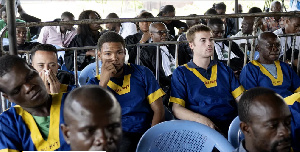- Home - News
- Polls
- Year In Review
- News Archive
- Crime & Punishment
- Politics
- Regional
- Editorial
- Health
- Ghanaians Abroad
- Tabloid
- Africa
- Religion
- Election 2020
- Coronavirus
- Photo Archives
- News Headlines
- Press Release
General News of Friday, 27 August 1999
Source: GNA
Report on Ex-Chief Executives released
Accra, Aug. 25, GNA - Two out of three former district chief executives in the Northern Region investigated for impropriety were found guilty while the third was exonerated. Alhaji A.Y.M.B. Ibrahima, former Tamale Municipal Chief Executive and Mr Issaka Bawa, former Chief Executive of East Mamprusi were found guilty while Mr J. S. Karim, former Chief Executive of East Gonja was exonerated.
These were contained in a statement issued by the Ministry of Local Government and Rural Development on Wednesday on the findings and recommendations of the three-member committee that investigated allegations of impropriety against the three former district chief executives. The committee, under the Chairmanship of Dr. Naaminong Karbo, exonerated Mr Karim but found that Mr. Ibrahima and Mr. Bawa breached regulations in the award of certain contracts.
The committee said the East Gonja District Assembly followed normal contract regulations and procedures in awarding 11 contracts between November 1998 and January this year. It, therefore, recommended that "the suspension placed on the 11 contracts be lifted and Mr Karim, the ex-district chief executive accordingly exonerated."
In the case of Mr Bawa, the report found he improperly awarded 30 contracts without reference to the District Tender Board at sums, which were not commensurate with the projects.
Consequently, a technical team is to be set up to re-value the contracts, confirm the technical quality of the designs and advice the assembly on the reactivation of the projects.
The assembly is also to recover the mobilisation advances granted beyond 20 per cent of the contract sums. The statement said the allegation that 120 million cedis got missing at the Tamale Municipal Assembly was found to be false.
It explained that out of the 220 million cedis budgeted for the Productivity Improvement and Employment Generation Fund (PIEGF), only 100 million cedis was paid into it.
This left a balance of 120 million cedis to be released out of the fourth quarter allocation of the district Assemblies' Common Fund and paid into the accounts of PIEGF also known as the Poverty Alleviation Fund. It, however, noted that Alhaji Ibrahima did not comply with policy guidelines for disbursement of the funds.
"The former MCE disbursed 99 million cedis out of the 100 million cedis to eight beneficiaries in excess of the prescribed levels and without reference to the credit allocation committee of the fund. "He also failed to seek clarification from the assembly.
To make matters worse, Mr Ibrahima gave a wrong impression to the assembly that the 120 million cedis was in the bank accounts of the Poverty Alleviation Fund.
The Ministry has directed the Tamale Municipal Assembly (TMA) to release the balance of 120 million cedis due to the Fund from the fourth quarter allocation of the common fund for 1998 to eligible enterprises in the Municipality.
The TMA is also to rectify the errors and mistakes in the loan agreements with the eight beneficiaries and recover the 99 million cedis plus the appropriate interest within 24 months.
The report said Alhaji Ibrahima breached contract and budget regulations and procedures. He awarded seven contracts at a total cost of 153.9 million cedis for projects not budgeted for by the assembly. He also did so without reference to the Tender Board.
"The seven contracts awarded in breach of the regulations and procedures are to be cancelled and any mobilisation advances paid recovered from the contractors by the Tamale Municipal Assembly." The Ministry said it has taken steps to ensure that internal auditing of the district assemblies are strengthened to ensure compliance with financial regulations.
Other actions taken are that with immediate effect, all assemblies should open and maintain registers of contracts and that the presiding members and chairmen of the finance and administration sub-committees should be joint signatories to the assemblies' contracts.
"Contract awards should be by open tender with selective tendering being the exception rather than the rule. "Assemblies must educate the public to realise that poverty alleviation fund is not a gift but a soft loan, which is repayable and that assemblies should ensure that the fund covers as wide a range of applicants as possible and not restricted to a privileged few".










